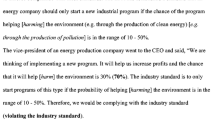Abstract
Recent experimental studies dispute the position that commonsense morality accepts ‘Ought’ Implies ‘Can’ (OIC), the view that, necessarily, if an agent ought to perform some action, then she can perform that action. This paper considers and supports explanations for the results of these studies on the hypothesis that OIC is intuitive and true.
Similar content being viewed by others
Notes
An objective obligation is one that depends upon the normatively relevant facts, regardless of whether the agent has access to those facts. For instance, suppose that, unbeknownst to Robert, pressing the elevator button will result in a deadly explosion. All other things being equal, Robert has an objective obligation to refrain from pressing the button, even if he is not aware of the consequences of pressing the button. By contrast, a subjective obligation is one that depends upon the evidence available to the agent. For instance, if Robert has a justified false belief that pressing the elevator button will result in a deadly explosion, then (all other things being equal) Robert has a subjective obligation to refrain from pressing the button. Since it is possible for an agent to form a justified false belief that they can ϕ, it is possible for an agent to have a subjective obligation that they cannot in fact fulfill. For this reason, OIC is formulated in terms of an objective obligation (cf. Vranas 2007 and Graham 2011).
Other formulations of OIC consider ‘ought’ to refer to an objective, pro tanto obligation, rather than an all-things-considered obligation (cf. Vranas 2007). This difference is peripheral to the discussion at hand.
A referee rightly notes that this distinction is not sufficiently fine-grained for cases in which an agent is no longer able to do something but can nevertheless regain this ability (at least under a certain conception of abilities). Since none of the vignettes considered in this paper involve an agent who can regain a lost ability, this distinction is arguably sufficiently fine-grained for the purpose of evaluating the experimental studies under consideration.
Alicke’s theory may receive support from the hypothesis that affect contributes to people’s intuitions (Greene et al. 2001; Nichols 2002), and the hypothesis that concrete cases involving wrongdoing are likely to elicit blame-involving emotions (Nichols and Knobe 2007). But this is only a tentative suggestion.
The blame validation hypothesis is not the hypothesis that people are sometimes subject to the process of blame validation in some experimental study or other. Rather, it’s the hypothesis that participants in the experimental studies under consideration are subject to the process of blame validation.
Since the mean rating for can (M = −33.01) is lower than the mean rating for blame (M = −15.48), and since 29 participants provided ratings for can that are above the midpoint, we have some reason to think that more than 29 participants provided ratings for blame that are above the midpoint.
Henne et al. (2016: 288) say that most people’s retraction of the claim that Brit ought to meet Dan suggests that ‘ought’ implies 'blame', and that this principle accords with Chituc et al.’s results. It is likely that they meant the converse since Chituc et al.’s results seem to support the converse principle, and since it is possible for someone to be obligated to do something without being blameworthy for anything.
References
Alicke, M. (2000). Culpable control and the psychology of blame. Psychological Bulletin, 126(4), 556–574.
Buckwalter, W., & Turri, J. (2015). Inability and obligation in moral judgment. PloS One, 10(8), 1–20.
Chituc, V., Henne, P., Sinnott-Armstrong, W., & De Brigard, F. (2016). Blame, not ability, impacts moral “ought” judgments for impossible actions: Toward an empirical refutation of “ought” implies “can”. Cognition, 150, 20–25.
Graham, P. A. (2011). ‘Ought’ and ability. Philosophical Review, 120(3), 337–382.
Greene, J., Sommerville, R., Nystrom, L., Darley, J., & Cohen, J. (2001). An fMRI investigation of emotional engagement in moral judgment. Science, 293(5537), 2105–2108.
Hannon, M. (forthcoming). Intuitions, reflective judgments, and experimental philosophy. Synthese. doi:10.1007/s11229-017-1412-1.
Henne, P., Chituc, V., De Brigard, F., & Sinnott-Armstrong, W. (2016). An empirical refutation of “ought” implies “can”. Analysis, 76(3), 283–290.
Kurthy, M., & Lawford-Smith, H. (2015). A brief note on the ambiguity of ‘ought’. Reply to Moti Mizrahi’s ‘ought, can and presupposition: An experimental study’. Methode, 4(6), 244–249.
Kurthy, M., Lawford-Smith, H., & Sousa, P. (2017). Does ought imply can? PloS One, 12(4), 1–24.
Mizrahi, M. (2015a). Ought, can, and presupposition: An experimental study. Methode, 4(6), 232–243.
Mizrahi, M. (2015b). Ought, can, and presupposition: A reply to Kurthy and Lawford-smith. Methode, 4(6), 250–256.
Nichols, S. (2002). Norms with feeling. Cognition, 84(2), 221–236.
Nichols, S., & Knobe, J. (2007). Moral responsibility and determinism: The cognitive science of folk intuitions. Noûs, 41(4), 663–685.
Schroer, J., & Schroer, R. (2013). Two potential problems with philosophical intuitions: Muddled intuitions and biased intuitions. Philosophia, 41(4), 1263–1281.
Vranas, P. (2007). I ought, therefore I can. Philosophical Studies, 136(b), 167–216.
Zimmerman, M. (1996). The concept of moral obligation. Cambridge: Cambridge University Press.
Author information
Authors and Affiliations
Corresponding author
Rights and permissions
About this article
Cite this article
Cohen, Y. An Analysis of Recent Empirical Data on ‘Ought’ Implies ‘Can’. Philosophia 46, 57–67 (2018). https://doi.org/10.1007/s11406-017-9892-2
Received:
Revised:
Accepted:
Published:
Issue Date:
DOI: https://doi.org/10.1007/s11406-017-9892-2




